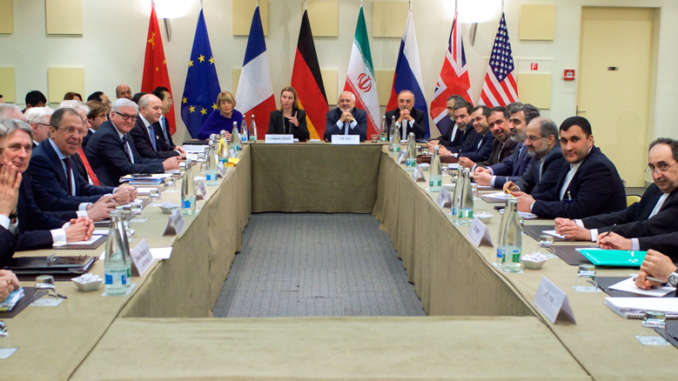
The asteroid seemed to appear out of nowhere on June 16, 2015. As it moved rapidly toward its rendezvous with the Earth after November 8, 2016, one could only watch helplessly as it drew ever closer. On May 8, 2018, President Trump’s withdrawal from the Joint Comprehensive Plan of Action (JCPOA) aimed at limiting Iran’s nuclear activities delivered a tremendous shock to the existing world order.
Days later, the aftershocks of that decision continue to reverberate across the world stage. Although Iran has expressed a desire to renegotiate a continuation of the agreement with the JCPOA’s other parties, it has threatened to commence industrial scale nuclear enrichment should those efforts fail. The European Union (EU) has expressed a determination to adhere to the agreement while preparing legislation that would protect its companies that do business with Iran from U.S. punishment. Foreshadowing the dangers of a possible climactic EU-U.S. showdown over sanctions, German Chancellor Angela Merkel declared, “It is no longer such that the United States simply protects us, but Europe must take its destiny in its own hands.”
The Chancellor’s remarks are extraordinary. They signal a reassessment of longstanding basic premises that the United States is the cornerstone of the free world and that the United States will use its economic, political, and military might to safeguard that world. They reflect an emerging calculation that the rest of the free world must increasingly look to itself for its security and prosperity.
Had U.S. withdrawal from the JCPOA been an isolated event, that withdrawal likely would not have produced nearly the shock that it did. Instead, it was one development among a series of events that have occurred over an amazingly short period of time. Since President Trump took office in January 2017, the United States has abandoned the Trans-Pacific Partnership (TPP) Agreement, the Paris Agreement, and the JCPOA. The United States has also walked away from NAFTA on political grounds throwing North American trade relationships into a perilous renegotiation process. Periodically, the United States has made noises about leaving the South Korea-U.S. free trade agreement, raised questions about whether it would honor NATO’s Article 5 mutual defense obligations, and suggested that it could seek to “save” money by eventually withdrawing its troops from South Korea.
All those actions have altered how the world views American foreign policy. Post-World War II American foreign policy was seen as largely immune to partisan transfers of leadership. Whether Democratic or Republican Presidents were elected, the U.S. honored its agreements and maintained a high degree of continuity in its foreign policy. Under President Trump, the U.S. has left agreements and revised foreign policy positions at a dizzying rate.
Following World War II, the United States understood that it possessed global responsibilities. President Harry Truman’s National Security Directive No. 68 explained:
“Our position as the center of power in the free world places a heavy responsibility upon the United States for leadership. We must organize and enlist the energies and resources of the free world in a positive program for peace which will frustrate the Kremlin design for world domination by creating a situation in the free world to which the Kremlin will be compelled to adjust. Without such a cooperative effort, led by the United States, we will have to make gradual withdrawals under pressure until we discover one day that we have sacrificed positions of vital interest.”
The United States proceeded to construct a world order built on the pillars of free markets, individual liberty, and representative government. It utilized its military power, economic might, and far-sighted foreign assistance investments, including the Marshall Plan, to build that order.
Even as the world passed through a nearly five decade-long Cold War, it avoided catastrophic international conflicts, freedom advanced, and its peoples enjoyed a stunning explosion of prosperity and technological advance. Without the United States, that order might never have come to pass.
Without American leadership today, that remarkable world order could become endangered. Risks to that world order could arise from the leadership vacuum created by ongoing American retreat, a global recognition of a loss of American reliability, an increasingly assertive role played by illiberal powers including Russia, and diminishing confidence among the world’s peoples in the post-World War II order as it decays.
Should the current world order ultimately give way to another order, it won’t be the first time that has happened. More worrisome is the prospect that the probabilities in a post-United States order could be tilted toward realpolitik; reduced international cooperation; illiberalism; and, elevated economic, political and national security uncertainty.
